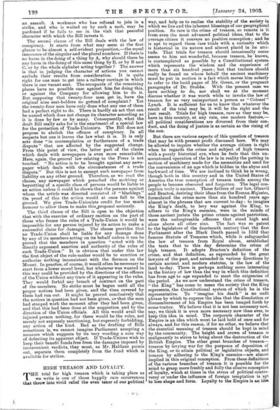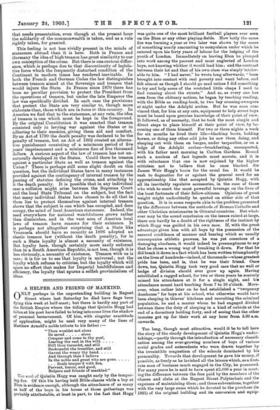HIGH TREASON AND LOYALTY.
MHE trial for high treason which is taking place as 11, we write is one of those happily rare occurrences that throw into vivid relief the even tenor of our political way, and help us to realise the stability. of the society in which we live and the inherent blessings of our geographical position. So rare is the crime of treason, so remote is it from even the most advanced political ideas, that to the average citizen it conveys no positive conception; and he is apt to regard these rare trials with a curiosity which is historical in its nature and almost placid in its atti- tude. That trials for treason should occasionally occur seems to .him not wonderful, because treason, he knows, is contemplated as possible by a Constitutional system which represents the ' wisdom and the experience of more than six hundred years ; but that traitors should really be found on whose behalf the ancient machinery must be put in motion is a fact which moves him soberly to refer to the lucid pages of Mr. Green, or the pregnant paragraphs of Dr. Stubbs. With the present case we have nothing to do, nor shall we at the moment discuss whether it was worth while to invoke the law of treason for so very unimportant a person as " Colonel " Lynch. It is sufficient for us to know that whatever the result of the trial may be, it will be the right and the just result. Trials for high treason, rare as they may be, have in this country, at any rate, one modern feature,— all political considerations are divorced from their con- duct, and the doing of justice is as certain as the rising of the sun.
But there are various aspects of this question of treason that may be with present profit discussed here. We may be allowed to inquire whether the average citizen is right when he regards the crime and subject of high treason with a purely historical eye, when he feels that this un- accustomed operation of the law is in reality the putting in motion of machinery made for the necessities and used for the convenience of an age which is hidden in the abyss and backward of time. We are inclined to think he is wrong, though both in this country and in the United States of America the true conception of treason tends among the people to become obscured and forgotten. The legal con- ception truly is ancient. Those fathers of our law, Glanvil and Bracton, deriving their ideas from the Roman Majestas, formulated the crime more than six hundred years ago almost in the phrases that are current to-day : to imagine the King's death, to levy war against the King, to adhere to the King's enemies, were in the minds of those ancient jurists the prime crimes against patriotism, were the unforgiveable offences that stood high and alone above all other sins. The fact was so patent to the legislators of the fourteenth century that the first Parliament after the Black' Death passed in 1352 that famous Statute of Treasons which, while it safeguarded the law of treason from Royal abuse, established the tests that to this day determine the crime of high treason. It adopts Bracton's definition of the crime, and that definition, as expounded by the great lawyers of the past, and extendedt in various directions by certain ancient and modern statutes, is the law of the land to-day. There is perhaps nothing more interesting in the history of law than the way in which this definition has from age to age expanded to meet the exigencies of the period. As we now understand the crime of treason, " the King " has come to mean the society that the King represents, the Constitutional system of which he is the representative. To " imagine his death " is no unfit phrase by which to express the idea that the dissolution or dismemberment of his Empire has been imaged forth by some traitor. We believe that it is not less necessary now, nay, we think it is even more necessary now than ever, to keep this idea in mind. The corporate character of the Empire is an idea which must be laid hold of once and for always, and for this reason, if for no other, we believe that the essential meaning of treason should be kept in mind by the community. The height and crown of treason is malignantly to strive to bring about the destruction of the British Empire. The other great branches of treason— treason by levying war for the purposes of deposition of the King, or to attain political or legislative objects, and treason by adhering to the King's enemies—are almost implied in this original conception. From these definitions of the various branches of treason it is possible for the mind to grasp more freshly and fully the elusive conception of loyalty, which at times in the stress of political contro- versy or under the influence of foreign temptation is apt to lose shape and form. Loyalty to the Empire is an idea
that needs presentation, even though at the present hour the solidarity of the commonwealth is taken, and as a rule rightly taken, for granted.
This feeling is not less vividly present in the minds of statesmen abroad than it is here. Both in France and Germany the idea of high treason has great similarity to our own conception of the crime. But there is one curious differ- ence, which is perhaps due to that discontinuity of legisla- tive force which the frequently disturbed condition of the Continent in modern times has rendered inevitable. In both the French and German Codes the law distinguishes between treason aimed at the Sovereign and treason that would injure the State. In France since 1870 there has been no peculiar provision to protect the President from the operations of treason, but under the late Emperor the law was specifically divided. In each case the provisions that protect the State are very similar to, though more elaborate than, those which are in force it this country. In America we find that to the statesman, at any rate, the idea of treason is one which must be kept in the foreground. By the original Constitution it was enacted that treason consisted only in levying war against the States or in adhering to their enemies, giving them aid and comfort. By an Act of 1790 the death penalty was declared to be the penalty of treason, but an Act of 1862 created an alterna- tive punishment consisting of a minimum period of five years' imprisonment and a minimum fine of five thousand dollars. A curious aspect of the law of treason has not un- naturally developed in the States. Could there be treason against a particular State as well as treason against the Union ? There is perhaps still some slight doubt on this question, but the individual States have in many instances provided against the contingency of internal treason by the passing of statutes defining the crime, and attaching to it the death penalty. It is possible that in any individual case a collision might arise between the Supreme Court and the local State Tribunal on the subject, but the fact that many individual States have chosen to do all that in them lies to protect themselves against internal treason shows that the subject is one which has occupied, and does occupy, the mind of local American statesmen. Indeed; the need everywhere for national watchfulness grows rather than diminishes, and in the vast area of America, local laws of treason have reasons for their existence. It is perhaps not altogether surprising that a State like Venezuela should have so recently as 1896 adopted an elastic treason law (without the *death penalty), for in such a State loyalty is almost a necessity of existence. But loyalty here, though certainly more easily enforced than in a South American Republic, is not less, though it is less obviously, a necessity of existence. Treason with us is rare ; it is for us to see that loyalty is universal ; not the loyalty which refuses to criticise, but the loyalty which will spare no effort that makes for Imperial healthfulness and efficiency, the loyalty that spurns a selfish provincialism of ideas.







































 Previous page
Previous page